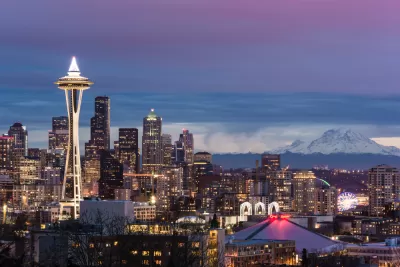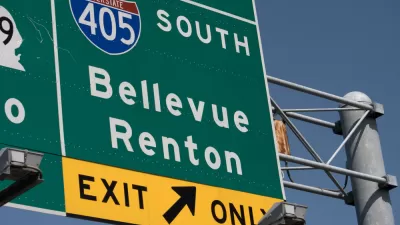Seattle and Bellevue are raising their standards for earthquake preparedness after a study of the Cascadia Fault showed the city was at greater risk than previously thought.

New research the University of Washington’s M9 Project shows previous estimates of the type of seismic activity possible in the area understated the risk. Now, Seattle buildings over 240 feet tall will face tougher seismic standards in the future, but some worry about the buildings already standing. "Researchers found the sedimentary basin under the city can amplify the type of ground motion that’s hardest on high-rises by a factor of two to five — much more than previous estimates," Sandi Doughton reports for the Seattle Times.
Some suggest retrofitting older buildings that may be particularly vulnerable. "Even before the new shaking estimates, older high-rises were known to have a greater risk of serious damage and collapse than buildings that meet modern seismic codes," Doughton writes. Some older construction would have used welds that can fracture. "The city also does not require retrofits for old brick buildings, a seismic menace California tackled decades ago," Doughton reports.
Part of the issue with earthquakes near the city comes from the sediment basin underneath the city of Seattle. The basin can amplify and prolong shaking much longer than other environments would. Still, scientists point out that even though they can study the issue, it’s impossible to know how exactly an earthquake would effect the area, because there hasn’t been an earthquake along the Cascadia Subduction Zone for more than 300 years and there’s no way to be certain all the possible effects.
FULL STORY: What if the megaquake happens when you’re in a Seattle high-rise? New study predicts stronger shaking

Planetizen Federal Action Tracker
A weekly monitor of how Trump’s orders and actions are impacting planners and planning in America.

Chicago’s Ghost Rails
Just beneath the surface of the modern city lie the remnants of its expansive early 20th-century streetcar system.

San Antonio and Austin are Fusing Into one Massive Megaregion
The region spanning the two central Texas cities is growing fast, posing challenges for local infrastructure and water supplies.

Since Zion's Shuttles Went Electric “The Smog is Gone”
Visitors to Zion National Park can enjoy the canyon via the nation’s first fully electric park shuttle system.

Trump Distributing DOT Safety Funds at 1/10 Rate of Biden
Funds for Safe Streets and other transportation safety and equity programs are being held up by administrative reviews and conflicts with the Trump administration’s priorities.

German Cities Subsidize Taxis for Women Amid Wave of Violence
Free or low-cost taxi rides can help women navigate cities more safely, but critics say the programs don't address the root causes of violence against women.
Urban Design for Planners 1: Software Tools
This six-course series explores essential urban design concepts using open source software and equips planners with the tools they need to participate fully in the urban design process.
Planning for Universal Design
Learn the tools for implementing Universal Design in planning regulations.
planning NEXT
Appalachian Highlands Housing Partners
Mpact (founded as Rail~Volution)
City of Camden Redevelopment Agency
City of Astoria
City of Portland
City of Laramie




























